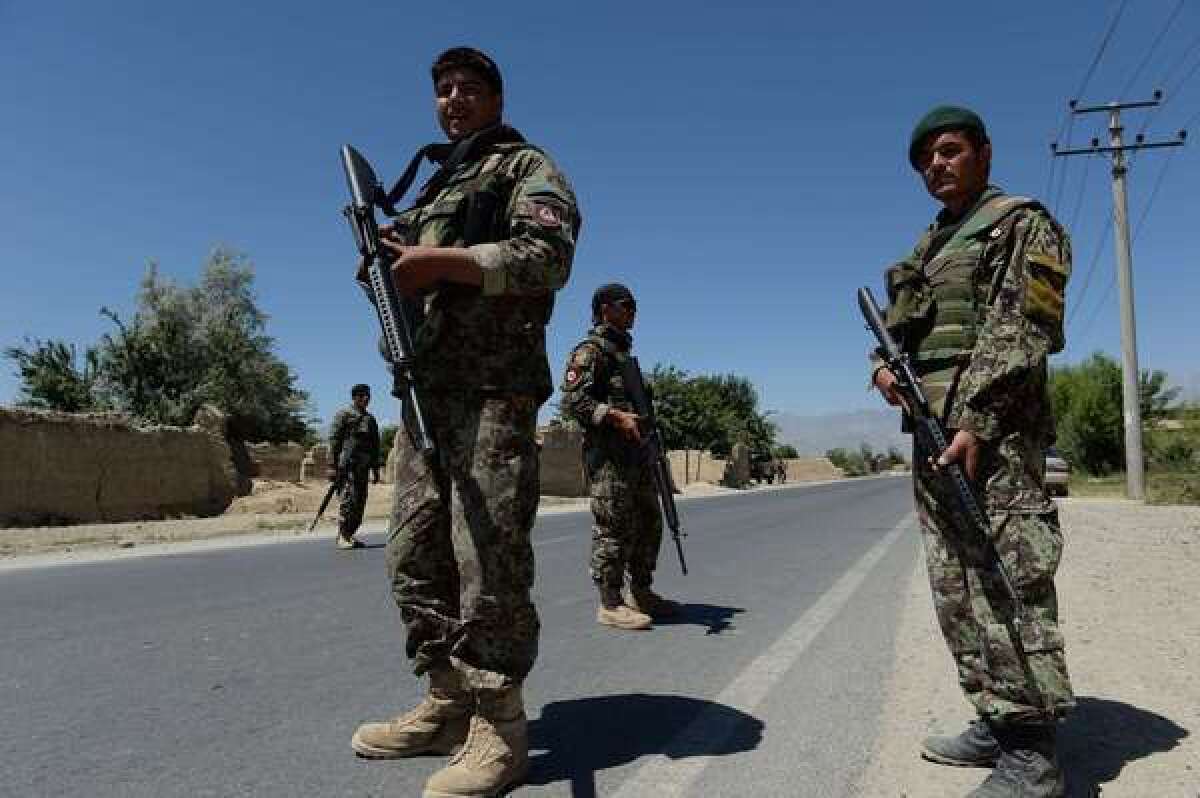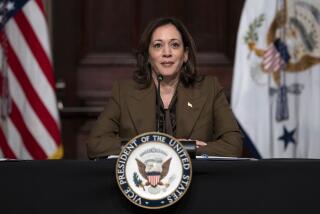Afghan government exits security talks with U.S.

- Share via
KABUL, Afghanistan -- Underscoring Afghan President Hamid Karzai’s reputation in Washington as a mercurial U.S. ally, the Karzai administration suspended security talks with the United States on Wednesday, apparently without warning, a day before U.S. officials were due to meet with the Taliban for informal talks.
In a statement that didn’t include much explanation, the Afghan president’s office said the suspension was made in light of the “contradiction between acts and the statements made by the United States of America in regard to the peace process.”
A few hours later, the presidential palace issued a second statement that said: “The Afghan High Peace Council will not attend the Qatar negotiations until they’re fully Afghanized,” adding that the opening of a Taliban office in the Persian Gulf nation on Monday undermined earlier assurances made by the United States.
The Afghan government didn’t detail those assurances or say how long the suspension would last.
Analysts said it appeared the Karzai government is miffed at being cut out of initial talks between Washington and the Taliban. While the insurgent movement has repeatedly dismissed Karzai as a U.S. puppet, it suggested Monday it would be willing to talk with the Afghan leader. But the Taliban and the Americans said they would meet together before conferring with the Afghan government.
Although the date has not been announced, U.S. officials are scheduled to hold their first formal meeting with the Taliban on Thursday, an Obama administration official said. The Taliban told reporters in Doha, the Qatari capital, that it wants to strengthen contacts with the international community.
Wednesday’s pull-out announcement came a day after NATO-led troops transferred final security responsibility to Afghan forces. The week’s flurry of activity, including the Taliban talks, security handover and Karzai’s apparent withdrawal, reflect a changing landscape as international allies and Afghanistan’s central Asian neighbors maneuver in advance of the withdrawal of NATO combat troops by the end of 2014.
The Afghan government earlier outlined preconditions it wanted Washington to insist on before talking to the Taliban, including a commitment by the insurgent group to communicate with the Afghan government, acknowledge the legitimacy of the Afghan Constitution and renounce violence.
The U.S., which has had informal, on-again, off-again contact with the Taliban in recent years without much result, didn’t insist on these preconditions, to Karzai’s apparent displeasure.
Waheed Muzhda, a Kabul-based political analyst, said the U.S. has balked at signing a U.S.-Afghan security agreement, not Karzai’s side, which is eager to nail down what aid Washington will provide. Furthermore, it appears Washington has been keen to talk to the Taliban first, then worry about a deal with Kabul, Muzhda said, knowing there will be a new Afghan government after the 2014 general election.
Washington and the Afghan president’s office have had their share of differences in recent years over alleged Afghan corruption, Taliban contacts, levels of U.S. financial support and the terms of the bilateral security agreement under discussion until Wednesday. These include whether U.S. forces would be immune from prosecution under a “status of forces” agreement governing military relations between the two countries.
Reports also suggest the Karzai administration was unhappy the Taliban opened its Doha office in the name of the Islamic Emirate of Afghanistan and was flying the Taliban flag, suggesting that it, rather than the Afghan government, represented the country’s interests.
The fragility of Afghanistan’s security situation and the huge challenges inherent in negotiating with the Taliban were underscored by a rocket attack on Kabul’s Bagram airfield late Tuesday that killed four Americans. The attack, for which the Taliban took responsibility, came just as President Obama was announcing talks with the insurgent group as part of what was termed an “important first step” toward reconciliation.
Analysts said the Taliban may have timed the attack to press its advantage entering the talks, thereby placing more pressure on NATO and Karzai to settle on its terms, given the Afghan government’s many problems and the alliance’s rapidly declining appetite for a fight.
“The Taliban wants to intensify the fighting in order to get more benefit at the negotiations table,” said Muzhda, a former Taliban official. “And this is a common approach across the world.”
U.S. officials have warned the peace process probably would be messy, with no assurance of success.
“We anticipate there will be a lot of bumps in the road, but the fact that the parties have an opportunity to talk and discuss Afghanistan’s future I think is very important,” President Obama said in announcing the talks Tuesday.
ALSO:
Obama to call for U.S.-Russia nuclear arms reduction
Protests continue in Brazil as thousands rally in Sao Paulo
Rowhani victory in Iran: Cause for hope, not expectations
Special correspondent Baktash reported from Kabul and Times staff writer Magnier from New Delhi. Times staff writer Kathleen B. Hennessey in Berlin contributed to this report.
More to Read
Sign up for Essential California
The most important California stories and recommendations in your inbox every morning.
You may occasionally receive promotional content from the Los Angeles Times.










